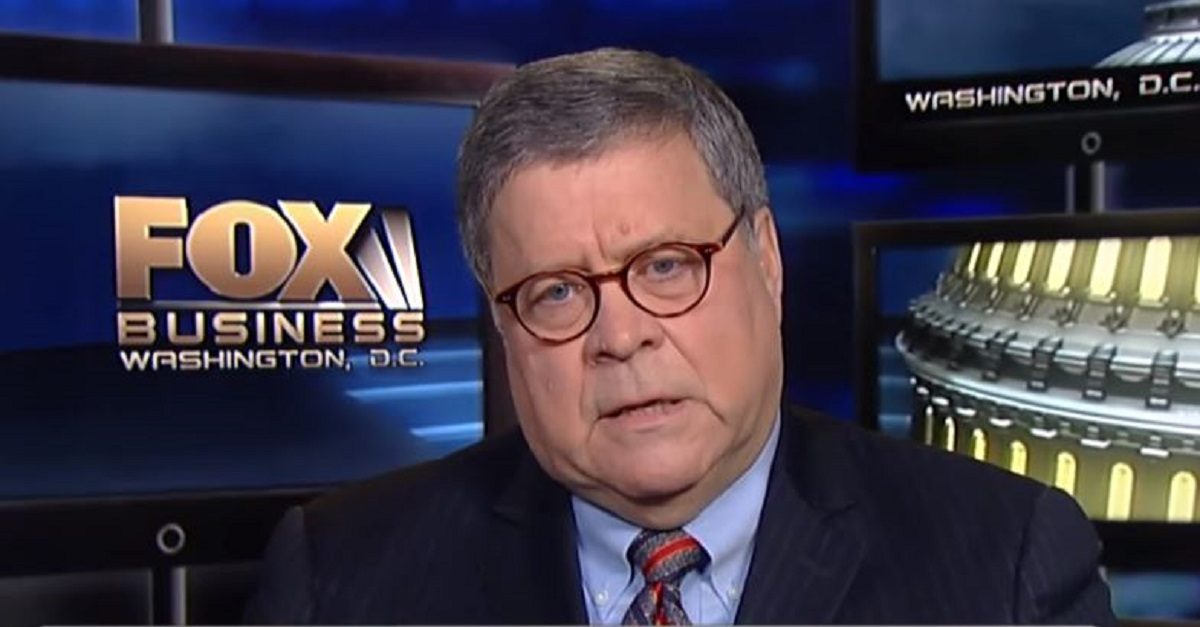
Confirmation hearing dates have been set for President Donald Trump‘s pick to replace Jeff Sessions as U.S. Attorney General. William Barr is scheduled to appear before the Senate Judiciary Committee on Jan. 15 and 16, although Barr’s nomination hasn’t officially been sent by the White House to the Senate. Matthew Whitaker continues to serve as acting Attorney General of the United States.
Outgoing Committee Chairman Sen. Chuck Grassley (R-Iowa) and incoming Chairman Sen. Lindsey Graham (R-S.C.) made the announcement on Wednesday.
The hearing will take place in the Hart Senate Office building. The news release from the Judiciary Committee said that Barr “will receive the same fair and thorough vetting process as the last five nominees to be Attorney General.”
This is not Barr’s first confirmation hearing rodeo.
In the video above, you can see Barr back in 1991 answering questions from lawmakers ahead of his 1991-1993 stint as AG during the presidency of the late George H.W. Bush.
As was the case after Whitaker was appointed as acting AG, Barr’s past comments on the issues are being viewed with heightened suspicion. The difference is that Whitaker never did go through the confirmation hearing gauntlet. Barr has defended Trump’s firing of FBI director James Comey and supported investigating Hillary Clinton, but his experience in the Department of Justice appears to give him a better chance of being confirmed in the Senate than Whitaker ever would, given Whitaker’s controversial comments about Robert Mueller‘s Russia investigation. Maybe that won’t turn out to be the case, but you can bet that one thing that will come up in hearings is Barr’s legal opinion on executive authority and independent counsels.
Almost 30 years ago, Barr, then assistant attorney general in the Office of Legal Counsel, wrote a memo that highlighted his concern about legislative “encroachments” on the executive branch’s power. Barr himself wrote that it was “[o]nly by consistently and forcefully resisting such congressional incursions can executive branch prerogatives be preserved.”
Barr put together a non-exhaustive list counting the ways the president’s power had been threatened. The third item on the list of 10 jumped off the page because Barr is complaining about “Attempts to Constrain the [President’s] Removal Power.”
Barr made clear there that he thought it is “essential” to the president’s power to be able to fire anyone. He wrote:
The President’s power to remove subordinates is essential to carrying out these responsibilities [of faithfully executing laws]. The constitutional limitations on congressional restrictions on the President’s removal authority “ensure that Congress does not interfere with the President’s exercise of the ‘executive power’ and his constitutionally appointed duty to ‘take care that the laws be faithfully executed’ under Article II.”
“Because the power to remove is the power to control, restrictions on removal power strike at the heart of the President’s power to direct the executive branch and perform his constitutional duties,” he continued. “In particular, the inability to remove officers erodes significantly the President’s responsibility to ‘take Care that the Laws be faithfully executed.’”
Barr went on to mention the outside prosecutors brought in for specific cases, writing, “We recognize that the Court upheld restrictions on the executive branch’s authority to remove an Independent Counsel in Morrison v. Olson.” This was in reference to the old rules for Independent Counsels that have since expired, but Morrison has been discussed in reference to Special Counsels like Mueller as well.
“[T]he power of the executive branch will be best preserved by vigorous opposition to such restrictions,” Barr said.
Barr is also remembered for advising George H.W. Bush to pardon multiple Iran-Contra Affair crimes. In 2001, Barr matter-of-factly said that he advised Bush to do this.
Recall that in 1992 Bush pardoned former Secretary of Defense Caspar Weinberger for the various crimes he was alleged to have committed during the Iran-Contra affair–just before Weinberger was slated to go on trial for perjury and obstruction of justice. This final pardon–the sixth in a series of Iran-Contra related pardons–completed a clean sweep for the Iran-Contra criminals who were, in fact, Bush’s own alleged co-conspirators in the national scandal.
Barr said nine years later that he “felt [some] had been unjustly treated and [wondered] whether [others] felt that they would have been treated this way under standard Department guidelines.”
“I don’t remember going through the pardon office, but I did ask some of the seasoned professionals around the Department about this, asked them to look into it,” he said. “Based on those discussions, I went over and told the President I thought he should not only pardon Caspar Weinberger, but while he was at it, he should pardon about five others.”
As far as what we could expect from an Attorney General Barr in 2019, one can look to a piece he co-penned for the Washington Post with other former AGs in support of former Attorney General Jeff Sessions. After Sessions resigned, Barr, Edwin Meese III, and Michael Mukasey, praised Sessions’ performance, noting his hardline stance against illegal immigration and drug dealers, as well as his push for religious freedom.
Ronn Blitzer and Colin Kalmbacher contributed to this report.
[Image via Fox Business screengrab]